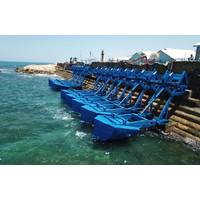U.S. Must Answer Russia's Challenge In The Arctic - Treadwell
Russian President Vladimir Putin's Arctic expansionism is a challenge the U.S. must answer with icebreakers, ports, and territorial claims of our own, Lt. Governor Mead Treadwell said today. Treadwell spoke this morning at the 34th Annual U.S.-Russia Forum in Washington, DC, on a panel focusing on foreign policy issues between the two nations.
Speaking just after Russia's Ambassador to the U.S., Sergey Kislyak, kicked off the program on foreign policy issues between the two nations, Treadwell talked about the need for cooperation with Russia despite disputes over Crimea and Ukraine, Syria and Iraq, which have brought U.S.-Russia relations to their lowest point in decades.
“My challenge to Russians is this: where we are neighbors, help bring our relations back to normal. Help us eliminate salmon by-catch in the North Pacific Ocean. Help us work together to prevent oil spills from all these ships coming through, and help us protect food security in the Arctic. Alaskans depend on this ocean for food and for jobs.
"My challenge to Americans is this: don’t let Russia go it alone in the Arctic. A quarter of the world’s oil and gas and one of the world's most important fisheries are located in the Arctic. Let’s exercise leadership now, by developing our own energy and building ports and icebreakers, and not let just one country control shipping.”
“In today’s tough international climate, we can’t forget we’re neighbors,” Treadwell said. "The Arctic situation demands cooperation and friendly competition. If we don't exercise stronger Arctic leadership, we will be sorry later."
Treadwell cited an April 22 speech by Russian President Vladimir Putin to his Security Council, committing for a stronger Russian military presence in the Arctic, and predicting that shipping in the Arctic would grow from 1.5 million tons in 2013 to four million tons in 2015. Putin also expressed his wish that ships using the Arctic be primarily under Russian control.
"Russian control of Arctic shipping is likely to produce more of the same kind of disputes we've had in the Caspian region," Treadwell said. "To prevent that, U.S. 2 icebreakers, U.S. Arctic ports, and a stronger U.S. Coast Guard presence will offer the world alternatives, healthy competition, instead of a monopoly."
Treadwell discussed Alaskans’ and Russians’ shared heritage and close family and cultural ties, which have grown since the Alaska-Russia border opened in 1988. In addition, Treadwell said Alaska and Russia cooperate now on commercial aviation, weather, and wildlife management at the border.
Both Treadwell and Kislyak called for expanding Alaska's trade with Russia, which at 10 or 11 million dollars per year, Treadwell said, is smaller than our trade with Mexico.
“There is much more trust and cooperation to be built all around the Arctic neighborhood,” Treadwell said. “Meanwhile, we need to stand up for Alaska's and America’s interests in the Arctic, no matter what difficulties we face with our neighbors.”




